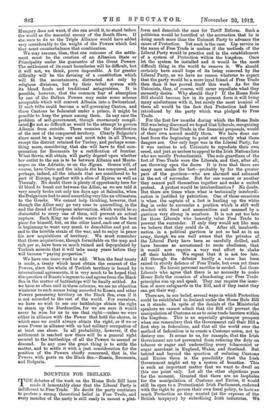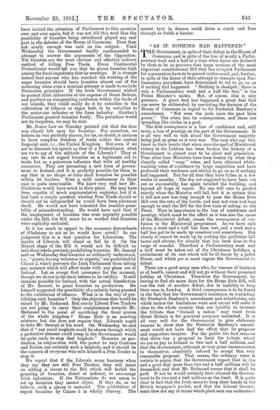BOUNTIES FOR IRELAND. T HE debates of the week on the
Home Rule Bill have made it lamentably clear that the Liberal Party is indifferent to Free Trade. No doubt the party continues to profess a strong theoretical belief in Free Trade, and every member of the party is still ready to mount a plat- form and demolish the case for Tariff Reform. Such a politician would be horrified at the accusation that he is doing much more than the Unionist Party to advance the cause of Protection. Yet such is the case. Lip service in the name of Free Trade is useless if the methods of the Liberal Party would in practice end in the establishment of a system of Protection within the kingdom. Once let the system be installed and it would be the most difficult thing in the world to remove it. We should certainly have small hope of its being removed by the Liberal Party, as we have no reason whatever to expect that the party would be a more loyal friend of Free Trade then than it has proved itself this week. As for the Unionists, they, of course, will never repudiate what they earnestly desire. Why should they ? If the Home Rule Bill should become law in its present form it will bring many misfortunes with it, but surely the most ironical of them all would be the fact that Protection had been introduced by the party which was pledged to Free Trade.
For the first few months during which the Home Rule Bill was being discussed we hoped that Liberals, recognizing the danger to Free Trade in the financial proposals, would of their own accord modify them. We have done our best from the beginning to point out exactly what those dangers are. Our only hope was in the Liberal Party, for it was useless to ask Unionists to repudiate their own creed, and just as useless to appeal to the Irish Nationalists who are mostly Protectionists. The sole guardians of the fort of Free Trade were the Liberals, and they, after all, are throwing open the doors. It is true that there are many men inside the fort—probably by far the greater part of the garrison—who are alarmed and ashamed at the act of surrender. But for one reason or another they cannot pull themselves together and make a united protest. A protest would be insubordination ? No doubt. But there are times when what is technically insubordi- nation is justified by patriotism. One of these occasions is when the captain of a fort is hauling up the white flag in order to surrender a position which is still well stocked with food and ammunition and manned by a garrison very strong in numbers. It is not yet too late for those Liberals who honestly value Free Trade to prevent the surrender. If only they would act like men we believe that they could do it. After all, insubordi- nation in a political garrison is not so bad as in an army, though we are well aware that the privates of the Liberal Party have been so carefully drilled, and have become so accustomed to mute obedience, that it would now require a very real effort to shake off their habits. We repeat that it is not too late. All through the debates hardly a voice has been raised in sturdy defence of Free Trade, but even yet there is time. No heroic personal sacrifice is needed. Let those Liberals who agree that there is no necessity to make Home Rule the occasion of abandoning our Free Trade principles rise up and speak. They can require the inser- tion of more safeguards in the Bill, and if they insist they can get their way.
There are, in our belief, several ways in which Protection could be established in Ireland under the Home Rule Bill as it stands. In spite of the denials of the Ministerial speakers we cannot admit that the Bill will prevent the manipulation of Customs so as to raise trade barriers within the kingdom. This is an especially grotesque prospect when one remembers that the Government call their Bill a first step in federalism, and that all the world over the method of federalism is to create a Customs union, not to destroy one. It seems to us, for example, that the Irish Government are not prevented from reducing the duty on tobacco or sugar and underselling every tobacconist or sugar merchant in England, Wales, and Scotland. But behind and beyond the question of reducing Customs and Excise there is the possibility that the Irish Government might set up a system of bounties. This is such an important matter that we want to dwell on this one point only. Let all the other objections pass for the moment. Granted that there are no loopholes for the manipulation of Customs and Excise, it would still be open to a Protectionist Irish Parliament, endowed with the right to govern their own fiscal policy, to have as much Protection as they wanted (at the expense of the British taxpayer) by subsidizing Irish industries. We have invited the attention of Parliament to this question over and over again, but it was not till this week that the possibility of bounties being introduced played any real part in the debates of the House of Commons. Even then not nearly enough was said on the subject. 'Until Wednesday the Government hardly condescended to attempt to answer the arguments of the Opposition. Yet bounties are the most obvious and effective indirect method of killing Free Trade. Every Continental Protectionist would tell you that he places bounties high among the fiscal expedients that he worships. It is strange indeed that anyone who has watched. the working of the sugar bounties should. leave bounties almost out of the reckoning when even a nominal attempt is made to exclude Protective principles. If the Irish Government wished to protect Irish industries at the expense of Great Britain, and produce an exasperating confusion within the trade of our islands, they could easily do it by subsidies to the cultivation of tobacco or sugar beet, or by subsidies to the motor-car industry or the linen industry. Grattan's Parliament granted bounties freely. The precedent would not be forgotten, we may be sure.
Mr. Bonar Law on Tuesday pointed out that the door was clearly left open for bounties. For ourselves, we believe he was perfectly sincere, for he, no doubt, is anxious to have complete freedom of trade within the central Imperial unit, i.e., the -United Kingdom. But even if we are to discount his speech as that of a Protectionist, what are we to say of the attitude of the Liberals ? They at any rate do not regard bounties as a legitimate aid to trade, but as a poisonous influence that wilts all healthy commerce. They are presenting a new form of govern- ment to Ireland, and it is perfectly possible for them to say that in no shape or form shall bounties be .possible within its borders. Even a mild. carelessness in their case is quite inexcusable. We know very well how Mr. Gladstone would. have acted. in their place. He may have been capable of much argumentative sophistry, but if it had been a simple question whether Free Trade should or should not be safeguarded he would have been plainness itself. He would not have tolerated the smallest possi- bility of misunderstanding. He would have said that if the employment of bounties was even arguably possible under the Bill, the Bill must be so worded that bounties were explicitly excluded.
Is it too much to appeal to the economic descendants of Gladstone to act as he would have acted ? In our judgment this is a test question for Liberalism. The loyalty of Liberals will stand or fall by it. On the Report stage of the Bill it would not be difficult to introduce words precisely prohibiting bounties. Mr. Samuel said on Wednesday that bounties as ordinarily understood, i.e., " grants having reference to experts," are prohibited by Clause 2, which prevents the Irish Parliament from taking any measure which will affect trade with any place out of Ireland. Let us accept that assurance for the moment, though we do not in the least believe in its validity. It still remains possible for Ireland, with the actual benediction of Mr. Samuel, to grant bounties on production. He himself suggested the possibility of a subsidy being granted. to the cultivation of tobacco. What is in the way of pro- hibiting such bounties ? Only the objections that would be raised. by Mr. Redmond. But surely Liberal Free Traders are not going to carry their complaisance towards Mr. Redmond to the point of sacrificing the fiscal system of the whole kingdom ? Home Rule is an exacting mistress, but she does not require that. Liberals ought to take Mr. Samuel at his word. On Wednesday he said that if " any small loophole could be shown through which a protective element could creep in the Government would be quite ready to stop that loophole." Bounties on pro- duction, in conjunction with the power to vary Customs and Excise, are certainly such a loophole, and it should be the concern of everyone who calls himself a Free Trader to stop it. We repeat that if the Liberals mean business when they say they are still Free Traders, they will insist on adding a clause to the Bill which will forbid the granting of bounties, direct or indirect, to encourage Irish industries, If the Nationalists do not mean to set up bounties they cannot object. If they do, as we believe, such a clause is essential. The prohibition of export bounties by Clause 2 is wholly illusory. The merest tyro in finance could drive a coach and four through so feeble a barrier.















































 Previous page
Previous page